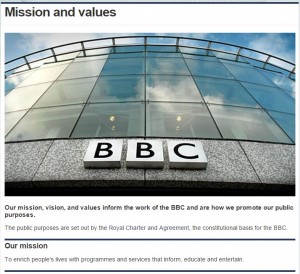Get on the Podium
Send us a message and let us know how we can help with your next project.
By Steve Maybury
When the BBC was founded by Lord Reith in 1922, it aimed to inform, educate and entertain the British public.
These three concepts provided the foundation stones for public service broadcasting, and to some degree or other, it has continued to this day: it remains part of the BBC’s current mission statement.

It’s a sensible ambition for all media content – whether you’re writing a blog or news article, recording a Youtube video, writing a tweet or just making a Facebook post, if it can be one of entertaining, informative or educational, you’re offering something of value to your audience (and if you’re doing none of those things, you really need to re-think your approach!)
However, there is now a fourth strand that arches across all the values: engagement.
Audiences don’t just want to be talked at, they want to be part of the experience. They want to give their opinions back, and to feel more valued as a result.
Engagement had been brewing for many years before social media made it explode. The phone-in, for example, has been a staple of radio and TV for a long time. It’s easy, and sometimes maddeningly controversial (we’re looking at you, Nicky Campbell), content that fills airtime and creates conversations.
Now with social it’s even easier. You don’t even need to go to the effort of screening callers: you just prompt the audience to take part and wait for the #hashtags to roll in. Choose whatever suits your editorial agenda and go for it.
In many areas of the media, engagement is now more sought after than anything else: you only need to listen to Radio 1 for an hour or so to realise that it easily rivals ‘entertainment’ as the priority, while education and information look on wistfully from the edge of the dance floor.
As a concept, despite its prevalence now, it’s still in its infancy and there’s no doubt quantity is ruling quality. It results in some rather cringeworthy bids by brands and broadcasters alike who are desperate for that audience and social media engagement.
For example: I can guarantee you’ll have heard a DJ or presenter read out people’s tweets that are so banal that rather than add to the matter in hand, they actually detract from it.
On the one hand, I want to defend the audience because Twitter’s character limit means it can be incredibly difficult to deliver a salient opinion on any issue that’s actually worth discussing.
On the other hand, if you can’t make an intelligent point that adds something to the debate, then don’t… The idea of informing, educating and entertaining goes both ways and I dream of a world where audiences unilaterally assume that responsibility, too, as part of their engagement.
Of course, regardless of content, it means there’s a big box ticked next to ‘audience engagement’, so Scott Mills and his producers can go home happy knowing that tens of thousands people tweeted them to tell them that Adele’s latest song about an emotional break-up was amazeballs LOL heart-shaped emoji.
Cynicism aside, engagement is hugely desirable as part of any social campaign, as long as you steer clear of that whiff of desperation. From a marketing perspective, it provides a measurable quantity that can help to demonstrate the impact of a campaign. As part of any social media campaign, once you go beyond communicating to your audience, and have them engaging with your company or brand, you’re on the way to enjoying a successful campaign.
BackSend us a message and let us know how we can help with your next project.